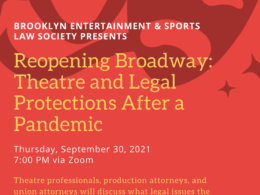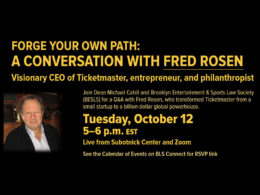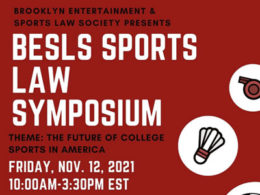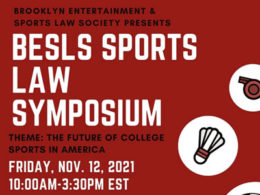On October 27th, the Brooklyn Entertainment and Sports Law Society hosted a panel focused on the new world of NFTs and how the future of music law will adapt. Brought on as panelists were James Gatto, Moish Peltz, and Colin Maher. Mr. Gatto is a Blockchain & Fintech Team Leader at the law firm Sheppard Mullin; Mr. Peltz is a Partner & IP Chair at the firm Falcon, Rappaport, & Berkman; and Mr. Maher is the Founder of Whisky Ghost Entertainment Law. Each panelist has a unique and relevant expertise, lending to an extremely valuable discussion on the future of music law given the recent introduction of NFT opportunities.
The panel began with a discussion on what exactly an NFT is. By definition, an NFT is a “Non-Fungible Token.” But what does this mean? Mr. Gatto explained how you can’t easily identify an NFT from other types of artwork, and that’s what makes it difficult in terms of regulation and ownership. Further, Gatto simplified the discussion by breaking an NFT down into a token and an asset; the token represents ownership of the NFT, and the asset is the actual art. Next, Mr. Peltz dove into the market for NFTs, showing that it is essentially a decentralized database with each NFT being its own unique asset. Lastly, Mr. Maher made comparisons to other music industry assets – buying an NFT is like purchasing a CD.
Not only is the classification of NFTs new and confusing, but it is bound to have an effect on the music business. Gatto and Maher both raised caution about uncertainties surrounding brand new revenue streams. Specifically, there are both benefits and problems that arise out of the lack of regulation. While there are concerns, there is also opportunity; being able to sell ownership to fans, ongoing royalties through NFTs, exclusive content, experiences, and access beyond just the song or album, are all new opportunities produced by the NFT market that will certainly have an impact on the music industry.
With blockchain technology allowing consumers to own something and have a direct relationship with artists, there are many legal and technological problems yet to be solved. Both Peltz and Gatto cautioned that because who has rights is contractual, not regulatory, dealing with NFT transactions is truly a case-by-case analysis. Given the contractual structure, there are layers of entities trying to figure out who owns rights, how to track royalties, and determine who has royalties.
Next, Gatto explained the relationships in the NFT marketplace. There are three different types of markets for artists to enter: Open Seas (open to everyone), Curated Market (have to request access to list NFT), and Proprietary Market (private market – e.g. highlights of NBA games; they only sell their own NFTs). These markets function because they take a certain percentage of the initial sale, opening up an opportunity for service, marketing, and distribution companies to create marketing platforms for artists.
Overall, all three panelists offered valuable insight on this new asset class, but also risk enhancing marketplace. Concluding thoughts of the panel focused on the role of lawyers; there is a huge role! Given the lack of regulation, knowledge, and information, lawyers are needed to exploit opportunities, avoid risk, and generate a functional market. Thank you to James Gatto, Moish Peltz, and Colin Maher for contributing to this extremely relevant discussion on NFTs in the music industry, and BESLS hopes to further the conversation from a legal standpoint as the market progresses.
We thank the panelists for partaking in this wonderful discussion.
Written by: Dan Erber
Dan is a 2023 J.D. Candidate at Brooklyn Law School




